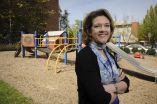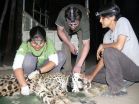(Press-News.org) An intervention that uses music and games to help preschoolers learn self-regulation skills is helping prepare at-risk children for kindergarten, a new study from Oregon State University shows.
Self-regulation skills - the skills that help children pay attention, follow directions, stay on task and persist through difficulty - are critical to a child's success in kindergarten and beyond, said OSU's Megan McClelland, a nationally recognized expert in child development and a co-author of the new study.
"Most children do just fine in the transition to kindergarten, but 20 to 25 percent of them experience difficulties - t hose difficulties have a lot to do with self-regulation," McClelland said. "Any intervention you can develop to make that transition easier can be beneficial."
The results of the new study are notable because positive effects of an intervention, especially one that aims to improve self-regulation and academic achievement, can be difficult for researchers to find, said McClelland, the Katherine E. Smith Healthy Children and Families Professor in the College of Public Health and Human Sciences.
The intervention was most effective among children who are considered at highest risk for struggling in school - those from low-income backgrounds who are learning English as a second language. In addition to a positive effect on self-regulation, the intervention had a positive effect on math achievement for English language learners.
"The math gain was huge," McClelland said. "English language learners who were randomly assigned to the intervention showed a one-year gain in six months. This was in spite of the fact that we had no math content in these games."
That indicates that children were more likely to integrate the self-regulation skills they've learned into their everyday lives, McClelland said. It also supports previous research finding strong links between self-regulation and math skills.
The study was published recently in Early Childhood Research Quarterly. Lead author Sara A. Schmitt conducted the research as a doctoral student at OSU and now is an assistant professor at Purdue University. In addition to McClelland, the other authors of the study are Alan C. Acock of Oregon State and Shauna L. Tominey of Yale University.
In all, 276 children enrolled in a federally funded Head Start program for at-risk children in the Pacific Northwest participated in the study. Children ranged in age from three to five, with most about four years old. Children were randomly assigned to either a control group or the intervention program.
The intervention ran for eight weeks, with two 20- to 30-minute sessions each week. Research assistants came into classes and led children through movement and music-based games that increased in complexity over time and encouraged the children to practice self-regulation skills.
One game used in the activities was "Red Light, Purple Light," which is similar to "Red Light, Green Light." A researcher acted as a stoplight and held up construction-paper circles to represent stop and go. Children followed color cues, such as purple is stop and orange is go, and then switched to the opposite, where purple is go and orange is stop.
Additional rules are added later to increase the complexity of the game. The game requires children to listen and remember instructions, pay attention to the adult leading the game and resist natural inclinations to stop or go.
"It's about helping the children practice better control," McClelland said. "The games train them to stop, think and then act."
Researchers evaluated children's self-regulation and academic achievement before and after the intervention and found that children who had received the intervention scored significantly higher on two direct measures of self-regulation. English language learners who participated in the intervention also scored significantly higher in math than their peers in the control group.
Researchers want to continue improving the games used in the intervention and expand the use of the intervention to more children, McClelland said. Because the games are somewhat simple and require few materials, training teachers is fairly easy and the program is relatively low-cost for schools, she said.
INFORMATION:
The study was supported by a grant from the Ford Family Foundation and by OSU.
We are all familiar with the hassles that accompany air travel. We shuffle through long lines, remove our shoes, and carry liquids in regulation-sized tubes. And even after all the effort, we still wonder if these procedures are making us any safer. Now a new type of security detection that uses terahertz radiation is looking to prove its promise. Able to detect explosives, chemical agents, and dangerous biological substances from safe distances, devices using terahertz waves could make public spaces more secure than ever.
But current terahertz sources are large, multi-component ...
You're at a slumber party with your friends. One friend asks "if a guy at school asked you out, but you weren't really attracted to him, would you go?" You laugh and shake your head no: "Why would I, if he's not my type?"
Or imagine you're at school, sitting in the cafeteria. A guy who you think is attractive but who has some unsuitable personality traits comes up and asks you out. You say yes, even though what you really meant to say was no. "Why did I do that?" you wonder.
According to new research from the University of Toronto and Yale University, rejecting unsuitable ...
As an actress, producer, director and theatre arts lecturer at The University of Texas at Arlington, Julienne Greer knows the techniques that help draw people's deepest emotions to the surface. Now, she's building on her experience and research to help scientists and robotics engineers better understand the human experience so that they can build more responsive robots.
Greer, who holds a master's degree in media arts and a doctorate in humanities, recently authored the paper, "Building emotional authenticity between humans and robots." In it, she referenced a robot named ...
OAKLAND, Calif., Nov. 21, 2014 -- Digoxin, a drug commonly used to treat heart conditions, was associated with a 71 percent higher risk of death and a 63 percent higher risk of hospitalization among adults with diagnosed atrial fibrillation and no evidence of heart failure, according to a Kaiser Permanente study that appears in the current online issue of Circulation: Arrhythmia and Electrophysiology.
Digoxin is a drug derived from digitalis, which has been used for more than a century for heart-rate control in patients with atrial fibrillation, and it remains commonly ...
Patients who receive more cells get significant benefits. That's a key lesson emerging from a clinical trial that was reported this week at the American Heart Association meeting in Chicago.
In this study, doctors treated heart attack patients with their own bone marrow cells, selected for their healing potential and then reinjected into the heart, in an effort to improve the heart's recovery.
In the PreSERVE-AMI phase II trial, physicians from 60 sites treated 161 patients, making the study one of the largest to assess cell therapy for heart attacks in the United States. ...
Scientists have identified four new genes associated with the severe food allergy eosinophilic esophagitis (EoE). Because the genes appear to have roles in other allergic diseases and in inflammation, the findings may point toward potential new treatments for EoE.
"This research adds to the evidence that genetic factors play key roles in EoE, and broadens our knowledge of biological networks that may offer attractive targets for therapy," said study leader Hakon Hakonarson, M.D., Ph.D., director of the Center for Applied Genomics at The Children's Hospital of Philadelphia ...
Study says leopards stay surprisingly close to homes
Leopard home range around humans can be comparable to world's best protected areas
Article available from PLOS ONE
NEW YORK (November 21, 2014) - In the first-ever GPS-based study of leopards in India, led by WCS and partners has delved into the secret lives of these big cats, and recorded their strategies to thrive in human-dominated areas.
The study concludes that leopards in human areas are not always 'stray' or 'conflict' animals but residents, potentially requiring policy makers to rethink India's leopard-management ...
November 21, 2014 -- A study conducted by researchers at Columbia University's Mailman School of Public Health shows that obesity costs the U.S. $8.65 billion per year as a result of absenteeism in the workplace --more than 9% of all absenteeism costs. The consequences of obesity among the working population go beyond healthcare and create a financial challenge not only for the nation but for individual states as well. Findings are published online in the Journal of Occupational and Environmental Medicine.
The study is the first to provide state-level estimates of obesity-attributable ...
Lugano/Geneva, Switzerland, 21 November 2014 - New evidence that immune checkpoint inhibitors may work in glioblastoma and brain metastases was presented today by Dr Anna Sophie Berghoff at the ESMO Symposium on Immuno-Oncology 2014 in Geneva, Switzerland.
The novel research shows that brain metastases have dense concentrations of tumour infiltrating lymphocytes, providing an immunoactive environment. Moreover, both primary and secondary brain cancers often exhibit high expression of the immunosuppressive factor programmed cell death ligand 1 (PDL1), which can be inhibited ...
One of the most mysterious forms of life may turn out to be a rich and untapped source of antibacterial drugs.
The mysterious life form is Archaea, a family of single-celled organisms that thrive in environments like boiling hydrothermal pools and smoking deep sea vents which are too extreme for most other species to survive.
"It is the first discovery of a functional antibacterial gene in Archaea," said Seth Bordenstein, the associate professor of biological sciences at Vanderbilt University who directed the study, "You can't overstate the significance of the antibiotic ...





